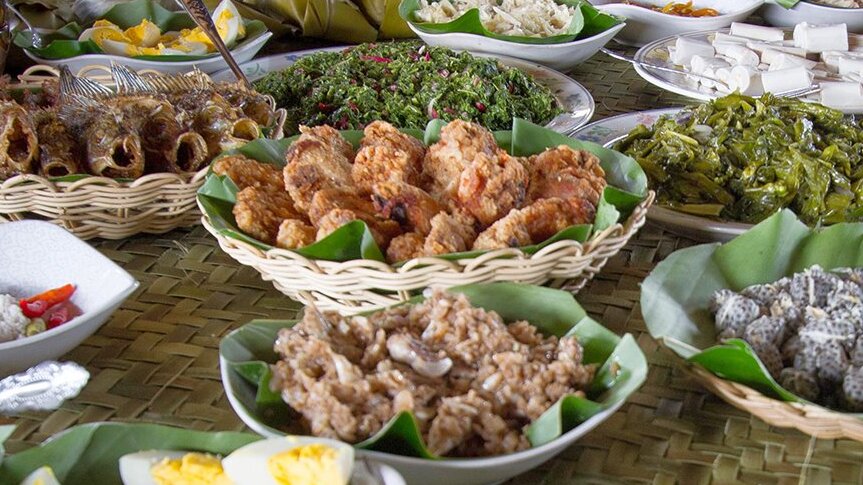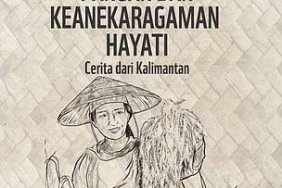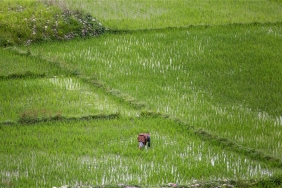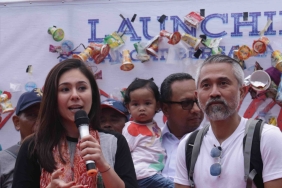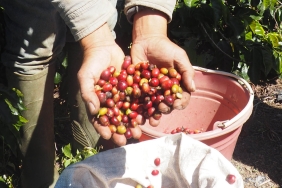GETTING TO KNOW GREEN CONSUMPTION PATTERNS TOGETHER
JAKARTA, August 29 - September 1, 2019 - WWF-Indonesia participated in the implementation of the Jakarta Eat Festival 2019 (JEF 2019) by bringing the Wise Foodways of the Archipelago campaign and the #BeliYangBaik campaign. In its second year of implementation, JEF 2019, which was held at Piazza Gandaria City Mall, carried out an environmentally friendly concept with a simple movement to bring their own shopping bags and drinking bottles.
Pangan Bijak Nusantara itself is part of the Local Harvest program initiated by several organizations, namely Hivos, WWF-Indonesia, ASPPUK, NTFP-EP, and AMAN. Pangan Bijak Nusantara is present as part of an effort to encourage changes in food consumption towards sustainable, local, fair and healthy. The "Local Harvest" program aims to contribute to economic welfare and reduce poverty in Indonesia by supporting changes in the consumption of local, fair, healthy and sustainable food products and encouraging changes in production systems at the level of groups of farmers, men and women, indigenous peoples, and micro, small and medium enterprises (MSMEs).
Tasting Enrekang and Toraja Coffee and Talking about Adan Rice, a Local Variety from Krayan.
Not only participating as a tenant participant, on the second day of JEF 2019 (31 August 2019), WWF through Pangan Bijak Nusantara organized Coffee Clinic: Cupping Test and Fun Manual Brewing. Not only as a learning event to make coffee, but also as an effort to introduce coffee from Enrekang and Toraja typical of South Sulawesi as one of the local products assisted by AMAN, a member of the Pangan Bijak Nusantara Consortium. Fadhel Achmad from Kesan Kopi as the barista instructor of the Coffee Clinic, taught the process of making coffee using manual brew techniques, from grinding to brewing.
The activities on the second day also continued with a Talkshow session with Pangan Bijak Nusantara. The talk show featured Miranda from Hivos, Jerinofel from FORMADAT (Highland Indigenous Peoples Forum) Krayan-North Kalimantan, as well as Cristina Eghenter as a representative of WWF-Indonesia. In this session, Nofel introduced Adan Krayan Rice, which is one of the commodities carried in the Pangan Bijak Nusantara campaign. As the name implies, this rice comes from the Krayan area in North Kalimantan and is produced naturally/organically. Unfortunately, this local rice product is not widely known in Indonesia. Instead, it has been better known and marketed to Malaysia and Brunei Darussalam, even though this rice is one of the rice from superior varieties with high flavors.
"From my place, Krayan, to Malaysia it is only 2 hours. So it is more famous there for its marketing. As for the country itself, it's just a matter of transportation that is more difficult to reach because there is no road yet. Hopefully, Adan Krayan Rice can be better known in the Indonesian community itself, especially in Java," said Nofel.
Continuing Nofel's conversation, Cristina revealed the reason why WWF joined the Pangan Bijak Nusantara consortium. The main reason is that the food production system is the main cause of environmental damage, both globally and in Indonesia itself. For this reason, wise consumption patterns by choosing food products that are local, healthy, fair and sustainable are very important to ensure that Indonesia's natural resources and biodiversity are preserved, and the future of the Earth is good.
The second day of Mini Stage activities was closed with a #BeliYangBaik Jingle competition. Participants will be given the opportunity to learn the Jingle entitled "Start From Yourself" sung by Nugie, then perform it in front of all JEF 2019 visitors.
Try to ride a bike
Bring your own shopping
And be a green consumer.
Buy good and eco-labeled
(A snippet of the song "Start From Yourself")
Making Delicious Siomay and Food Wrap from Wise Food Commodities of the Archipelago
Sunday morning (1/09) JEF 2019 at the Main Stage was enlivened by the presence of Chef Normal Ismail along with 8 mother and child pairs. The activity titled "Fun Cooking: Mom and Kids" this time will make tilapia dumplings. The ingredients used are certainly not arbitrary. The Tilapia fish used as the main raw material is ASC certified. Not only that, the sago and palm sugar used are also examples of Pangan Bijak Nusantara products assisted by ASPPUK from Southeast Sulawesi. This activity, which is part of the Pangan Bijak Nusantara campaign, wants to introduce, especially to the public, to become wise consumers who choose food products that are local, healthy, fair, and sustainable.
The series of JEF 2019 activities with WWF-Indonesia ended with a workshop: Bee's wax Food Wrap by Jessica Halim from Demi Bumi. Workshop participants learned how to make environmentally friendly bee's wax food wraps. With just a cloth, iron, honeycomb, and coconut oil, we can make eco-friendly food wraps! In this workshop, the coconut oil used is a commodity of Pangan Bijak Nusantara.
As smart consumers, we must also consider the waste generated from the products we consume. For this reason, with this innovation, the amount of household waste, especially plastic from food wrapping can be greatly reduced.
Let's start living a more eco-friendly lifestyle. It all starts from the selection of cooking ingredients and products that we consume that are local, natural, durable, healthy, fair and sustainable. Don't forget to choose products with minimum waste. Of course it would be much better if our consumption does not produce waste.
,>

